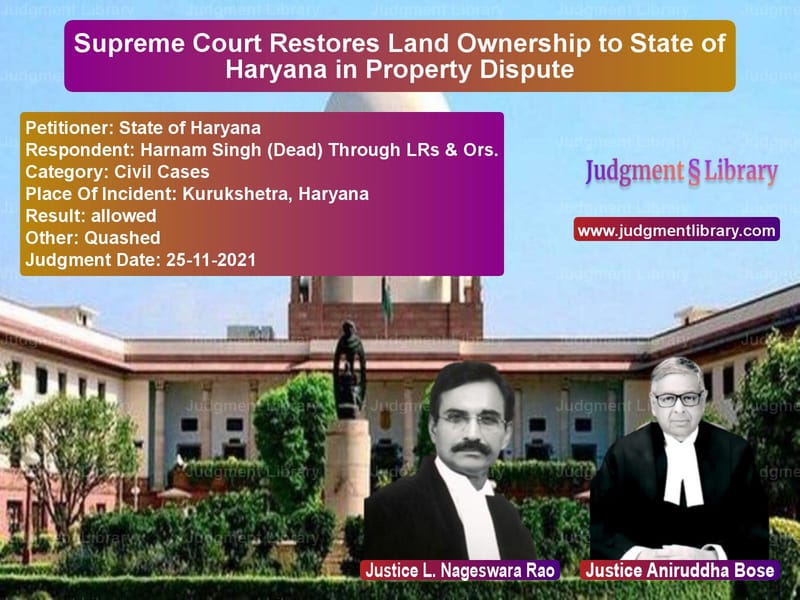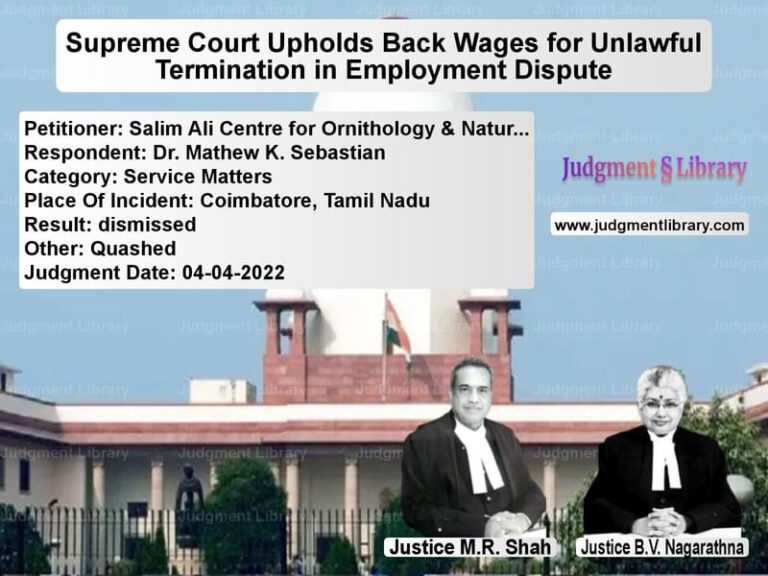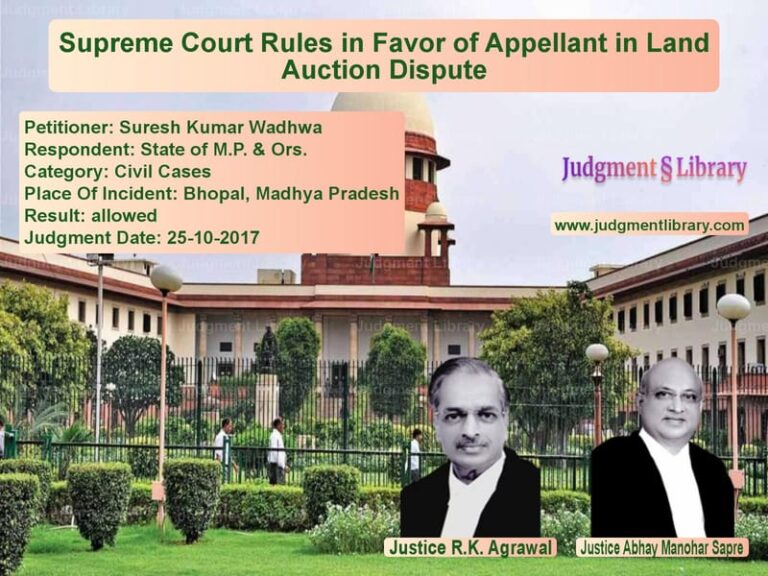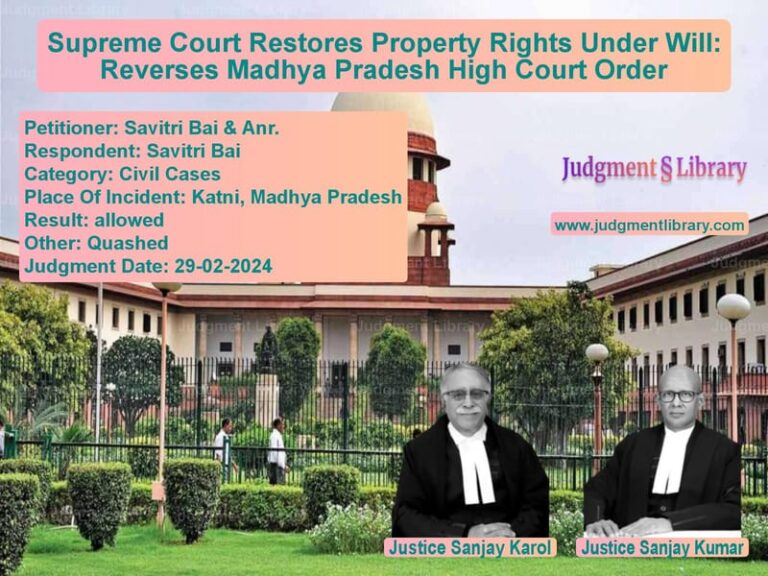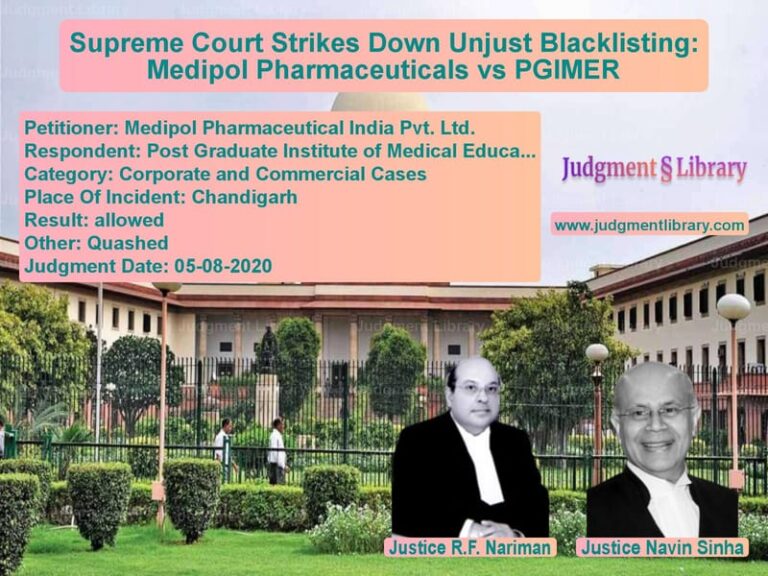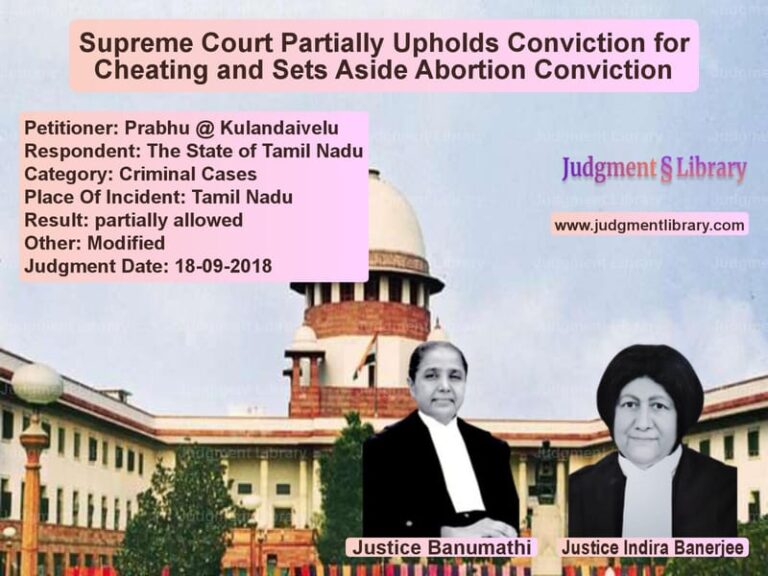Supreme Court Restores Land Ownership to State of Haryana in Property Dispute
The Supreme Court of India, in its judgment dated 25 November 2021, ruled in favor of the State of Haryana, setting aside the Punjab and Haryana High Court’s decision and restoring the Trial Court and First Appellate Court’s findings regarding a disputed will. The case, State of Haryana vs. Harnam Singh (Dead) Through LRs & Ors., revolved around the inheritance of agricultural land following the death of Kishan Singh, with conflicting claims arising between the State of Haryana and a private individual.
Background of the Case
The dispute concerned 52 kanals and 3 marlas of agricultural land located in Kurukshetra, Haryana. Upon the death of Kishan Singh on 15 January 1975, Harnam Singh, a non-relative who had been tilling Kishan Singh’s land, claimed ownership based on a will allegedly executed by Kishan Singh on 10 December 1974. However, the mutation authorities refused to recognize this will and, applying the doctrine of escheat, mutated the land in favor of the State of Haryana.
Harnam Singh subsequently filed a civil suit on 29 May 1978, seeking a declaration that the mutation in favor of the State was wrongful and that he was the rightful owner of the land. The suit was contested by the State of Haryana, along with certain relatives of Kishan Singh, who also staked a claim.
Read also: https://judgmentlibrary.com/supreme-court-grants-ownership-declaration-in-karnataka-land-dispute/
Petitioner’s Arguments
The State of Haryana, represented by its legal counsel, argued:
- The will relied upon by Harnam Singh was fabricated and did not meet the legal requirements under Section 63 of the Indian Succession Act, 1925.
- The will did not provide specific details of the land bequeathed but merely stated a general disposition of “all self-acquired and other movable and immovable properties.”
- The attesting witnesses of the will were not credible and had no close connection with the deceased.
- The thumb impression on the will was not proven to belong to Kishan Singh, raising serious doubts about its authenticity.
- The High Court overstepped its appellate jurisdiction by re-evaluating factual findings instead of restricting itself to legal issues.
Respondents’ Arguments
Harnam Singh’s legal representatives countered these claims, asserting:
- The will was duly executed by Kishan Singh, with proper attestation and a valid intention to bequeath his property to Harnam Singh.
- The State of Haryana could not claim the property under the doctrine of escheat since Kishan Singh had made a lawful disposition of his property.
- The Punjab and Haryana High Court had rightly concluded that the will was legally executed and should be upheld.
- Harnam Singh had been in possession of the land and had cultivated it for years, further establishing his rightful claim.
Supreme Court’s Observations
The Supreme Court bench, comprising L. Nageswara Rao and Aniruddha Bose, examined the evidentiary record and the legal principles governing the execution of wills. The Court noted:
- The Trial Court and the First Appellate Court had both disbelieved the will, holding that its execution was not satisfactorily proven.
- The High Court had improperly re-evaluated factual findings instead of focusing on legal issues.
- The attesting witnesses did not inspire confidence, as they were not closely associated with Kishan Singh.
- There were contradictions regarding where and how the will was executed.
- The absence of a registered will further weakened Harnam Singh’s claim.
Key Supreme Court Rulings Cited
The Court relied on several important precedents:
- Suraj Lamp & Industries Pvt. Ltd. v. State of Haryana (2012) – Emphasizing the necessity of proving the execution of documents with clear evidence.
- H. Venkatachala Iyengar v. B.N. Thimmajamma (1959) – Defining the burden of proof in establishing the validity of a will.
- Janki Narayan Bhoir v. Narayan Namdeo Kadam (2003) – Stating that mere attestation of a document does not validate its execution.
Final Judgment
The Supreme Court ruled in favor of the State of Haryana and issued the following directives:
- The judgment of the Punjab and Haryana High Court was set aside.
- The findings of the Trial Court and the First Appellate Court, which had dismissed Harnam Singh’s claim, were restored.
- The State of Haryana was declared the rightful owner of the land under the doctrine of escheat.
- The legal heirs of Kishan Singh were given the option to pursue their claim separately if they wished to challenge the escheat ruling.
Implications of the Judgment
The Supreme Court’s ruling has significant implications for inheritance law and government land claims:
- Strengthening the Doctrine of Escheat: The judgment reaffirms that properties without a valid heir will revert to the state.
- Ensuring Proper Execution of Wills: The ruling emphasizes that wills must meet all legal requirements to be enforceable.
- Limiting High Court Interference in Factual Findings: The case sets a precedent that High Courts must not overstep their jurisdiction in appeals under Section 100 of the Civil Procedure Code.
- Clarifying Land Succession Rules: The decision provides guidance on how disputed wills and inheritance claims should be handled.
The Supreme Court’s judgment in State of Haryana vs. Harnam Singh upholds the rule of law by ensuring that land ownership disputes are resolved based on valid legal principles and evidence.
Petitioner Name: State of Haryana.Respondent Name: Harnam Singh (Dead) Through LRs & Ors..Judgment By: Justice L. Nageswara Rao, Justice Aniruddha Bose.Place Of Incident: Kurukshetra, Haryana.Judgment Date: 25-11-2021.
Don’t miss out on the full details! Download the complete judgment in PDF format below and gain valuable insights instantly!
Download Judgment: state-of-haryana-vs-harnam-singh-(dead)-supreme-court-of-india-judgment-dated-25-11-2021.pdf
Directly Download Judgment: Directly download this Judgment
See all petitions in Property Disputes
See all petitions in Succession and Wills
See all petitions in Judgment by L. Nageswara Rao
See all petitions in Judgment by Aniruddha Bose
See all petitions in allowed
See all petitions in Quashed
See all petitions in supreme court of India judgments November 2021
See all petitions in 2021 judgments
See all posts in Civil Cases Category
See all allowed petitions in Civil Cases Category
See all Dismissed petitions in Civil Cases Category
See all partially allowed petitions in Civil Cases Category

